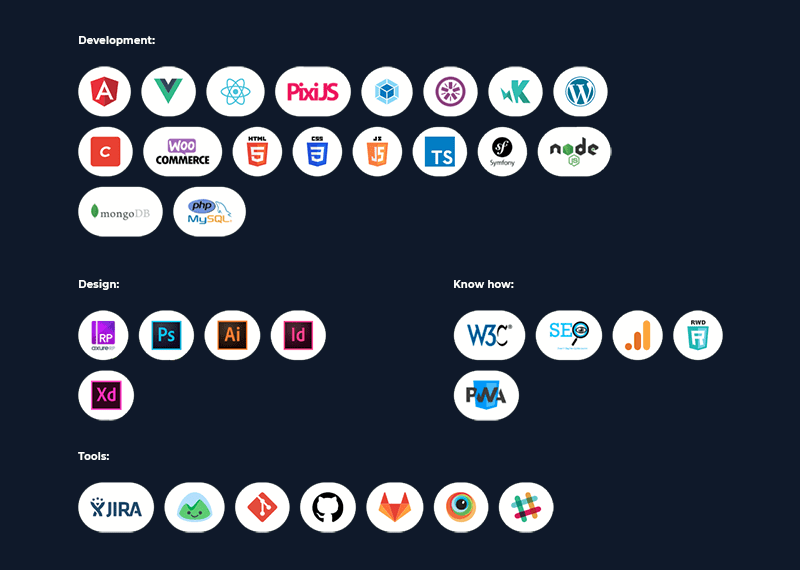What is a Software House?
Let’s start by defining what we mean by “software house”. This term refers to a company specializing in software development. Now, that’s a fairly broad definition that includes both programming companies that produce software solely for specific business environments, as well as individual programming studios.
For the purposes of this article, we will use the term “software house” to refer to a web development agency that offers programming services for a wide range of clients. An example of such services includes leasing, i.e. “renting” of its programmers, and implementation of projects at the client’s requests.
In addition to programming skills, software houses also offer related services, such as consulting, business analysis, UX and UI design, and SEO optimization. However, such companies usually do not offer marketing services or advertising, like an interactive agency typically would.
A software house is a company that can help you implement programming projects.
The top 6 advantages of a good software house
1. Technological specialization
Each web development company has its own tech stack, i.e. a set of technologies used by the company. A tech stack usually includes programming languages (PHP, JavaScript, Python, Java, C ++), frameworks (Symfony, Laravel), libraries, UI and UX design tools, and server solutions.

Such specialization allows us to gather more experience as we continually implement new projects using specific technology and work optimization tools, consequently expanding our knowledge base (point 2).
In most cases, individual team member skills complement each other. Programmers specializing in front-end work cooperate with back-end developers, testers check the functions and quality of the product, and project managers oversee the whole implementation process at every stage of its execution.
A similar specialist team can be created as an entire programming department. However, only technology companies or corporations usually have sufficient resources to afford such a department. Creating this type of unit requires experience, appropriate knowledge, and time. Cost-benefit calculation is also important. Such an undertaking may not make sense if the workload is relatively small (for example only one project).
Freelancers can also be specialized in certain technologies. However, specialization in one type of technology (e.g. programming in C ++) makes it impossible to get to know other technologies (e.g. JavaScript) well enough. Therefore, the implementation of a complex project may be impossible for a single freelancer.
2. Design methods and efficient communication
Software houses must develop an efficient process of project implementation and communication with the client. Otherwise, survival in such a competitive market is impossible. So, if a company stays in business and evolves, it probably means that it is doing its job effectively.
Experienced web development teams work methodically while completing their projects. Most often, they use an existing and proven method such as: agile, scrum, waterfall. If used correctly, these methods greatly improve efficiency and allow for an easy workflow between multiple people and complex projects.
The project team is not just a group of programmers trying to “create” a computer program. There are also people responsible for coordination, task and schedule management, communication with the client, and identifying and removing potential obstacles that may pop up unexpectedly during implementation. All of this significantly increases the likelihood that the project will be properly completed, delivered on time, and that each client will be kept fully informed for the duration of the entire process.
The implementation of an IT project is not limited to programming. It is also crucial to define the client’s needs and goals, prepare specifications, analyze solutions, test, collect feedback, and ultimately implement. Each of these steps is just as important as any other and each has its own methodologies and procedures. Just as it is in the interest of the client, it is also in the interest of the software house to ensure that these stages are effective and proceed smoothly. Good software house do not waste customers’ time.
There is a significant difference when comparing a software house with freelancers. The latter do not use tools and methodologies. Consequently, it is the client’s responsibility to identify problems, monitor works, and enforce their effects.
3. Quality of implementation
Due to the fact that software houses focus on programming work, they are able to both develop effective work implementation processes and delegate the best specialists to that work. The working environment requires continuous professional development; gathering experience and improving one’s skills. Consequently, specialization improves as well.
Software houses, when recruiting new employees, analyze candidates’ experience, knowledge, and potential before selecting the best option. Therefore, the specialization of software houses in the programming domain allows you to create a competent team. This translates into higher quality implementations. In other words, if you want to work with the best programmers, go with a web development company.
Software houses usually have internal tools and procedures for verifying the quality of work. Thus, the customer receives a proven product of the highest quality.
Freelancers, despite the fact that their skills and experience may be significant, usually do not work in organized teams in which quality control is part of the process. This means that the customer must independently inspect the delivered product.
4. Balancing budget control and flexibility
A programmer is currently one of the best-paid jobs out there, thus the cost of recruiting and employing a good developer is quite high.
Companies that create their own team of programmers must take into account the high cost of maintaining that team, even during times when business is slow. Outsourcing of programming work to specialized programming companies allows you to reduce costs and only pay for what you need at that time.
Cooperation with a software house on a fixed price basis (specific budget) allows the client to strictly control project implementation costs. Even the time & material method (open budget, time-based fee) allows you to control costs because it obliges the software house to accurately report working time and how it was spent.
This point reveals a significant difference between a software house and in-house programming teams. A software house can offer specific financial conditions for the implementation of specific works on the fixed price basis or in time & materials method. Conversely, a company’s own programming department will find it much harder to forecast costs before starting a project.
What are some of the expenses an in-house programming team must consider? Recruiting and maintaining employees, team management costs, purchasing needed computer hardware and software, paying for office and administrative rentals, and covering bonuses, vacations, and sick leave.
There are methods and tools for monitoring working time and cost reporting, but they are still not as accurate or convenient as choosing to outsource. A software house can either estimate the total cost of work according to a fixed price or provide easily verifiable invoices.
5. Time-saving
One of the greatest benefits of hiring a software house is saving time. Choosing a software house means clients don’t have to recruit programmers, verify their skills, and hire employees to oversee project coordination, produce reports, and handle testing.
In most cases, just one person from the client’s side is enough to maintain adequate contact with the software house, verbalize needs, and verify that the finished product is in line with the client’s original needs and specifications. Regardless of whether the project is carried out using the agile or the waterfall method, all processes that do not require the client’s participation are carried out independently by the software house team.
6. Post-implementation support
Most companies guarantee post-implementation support as part of any work agreement. At Genusware, we usually offer support for 12 months. In our experience, that is a reasonable and sufficient time period.
Despite extensive tests and quality control measures prior to completion, it is also very important to monitor newly implemented websites for at least a few weeks post initial launch. This allows for the detection of any errors, and also serves as a starting point for any needed improvements or development.
While our own programming department guarantees support and enables internal product development, you can’t expect such warranty service from freelance programmers. Especially if it is a solo freelancer with no means of quickly verifying and checking customers’ notifications.
Summary
Choosing which project implementation method is right for you depends on several factors: budget, schedule, complexity, technological requirements, and development prospects.
In some cases hiring a freelancer may be a good idea, especially if the project isn’t complex, has a well-defined specification, designed layout, and the freelancer has a reputation for a high level of service.
However, even in this scenario, it can still be difficult for a non-specialist to verify the competencies of a programmer. So, many feel as though they should supervise their freelancer’s work. Moreover, a satisfactory end result and post-production support are usually not guaranteed when hiring a freelancer.
In case of more complex projects, the choice remains between creating or developing your own programming department or hiring a software development company.
An in-house IT department is necessary in large companies, especially among businesses producing software for their own use or developing their own products. Incidentally, it should also be pointed out that collaboration between an internal IT department and an external software house can prove effective. We can confirm this from our own firsthand experience.
The biggest advantage of cooperating with a software house, as with most forms of outsourcing, is the convenience and flexibility of the agreement. Your project will be easily planned, with framework and costs clearly defined. You’ll be in better control of both the costs and timeframes as well. As a general rule, software houses guarantee the highest quality final product.
We sincerely hope that this article will help you decide the best route for you. If you have any comments, please let us know on our Facebook fanpage 🙂 and if you wish to start your online journey contact us we’re happy to work on your big idea.
